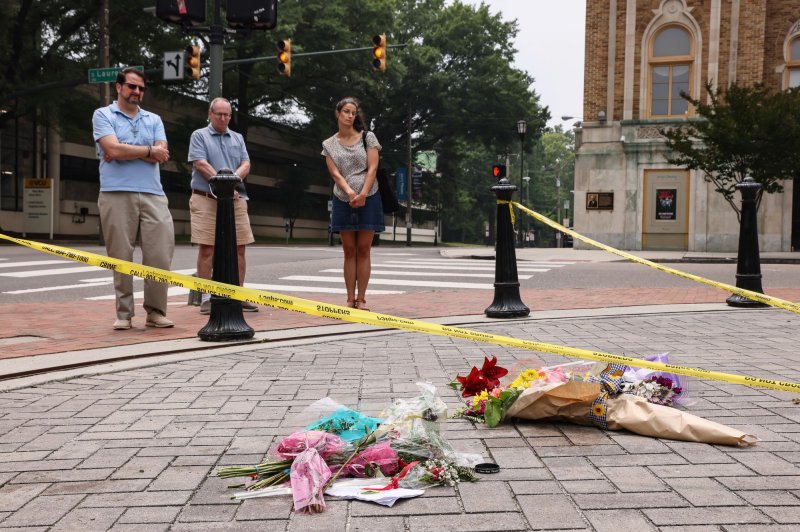1 of 2 | Community members pay their respects at an impromptu memorial at Monroe Park in Richmond, Va., where 18-year-old high school graduate Shawn Jackson and his father, 36-year-old Renzo Smith, were gunned down after a graduation ceremony for Huguenot High School in June. File Photo by Jemal Countess/UPI |
License Photo
WASHINGTON, Nov. 28 (UPI) -- After passing bipartisan gun legislation last year, senators clashed Tuesday over the next steps in addressing gun violence.
Democrats had called the Senate Judiciary Committee hearing to address what they called a public health crisis caused by guns.
"Gun violence is a public health epidemic, plain and simple," said Chairman Dick Durbin, D-Ill.
Republican members were hesitant to identify gun violence as a public health crisis. Instead, they argued that such a label would be used to curtail Americans' Second Amendment rights.
"With using public health authorities as a blanket excuse to strip away constitutional rights. We're framing gun violence as an epidemic that divides us more than it unites us," said ranking member John Cornyn, R-Texas.
Both sides, however, agreed that gun violence needed to be addressed.
"If today is an average day, by the time we finish this hearing ... roughly eight Americans will have been murdered, about twice as many will have killed themselves and countless others will have been violently victimized. Much of that violence will involve firearms," testified Amy Swearer, a senior legal Fellow from the Heritage Foundation.
Although the hearing did not create a clear path forward for gun legislation, the committee's Democratic and Republican members agreed that despite division across the committee, a solution would only present itself through bipartisan support.
"You don't get anything done on gun violence around here without bipartisan cooperation," said Sen. Thom Tillis, R-N.C.
Durbin echoed that when he reflected on the passage of the 2022 Bipartisan Safer Communities Act, which among other measures included $250 million in funding for community violence intervention and $250 million for states to provide comprehensive community mental health services.
Durbin commended Cornyn for his willingness to work across the aisle.
"That took real courage, John. We may disagree on a lot of issues, but at a time when we needed to act you did your best, and I thank you for that," Durban said.
Although Republican members such as Sen. Ted Cruz of Texas stressed the need to uphold the Second Amendment, Tillis, one of the Republican senators who introduced the 2002 Bipartisan Safer Communities Act, emphasized that enacting gun legislation is not meant to strip Americans of their constitutional rights.
"There have been 168,971 purchase transactions for under 21 since then ... [and] 428 were denied based on the Safer Communities Act. So to the Second Amendment advocates who said this was going to lead to a mass confiscation, they're patently wrong," Tillis said.
A June 2023 report from the Johns Hopkins Bloomberg School of Public Health found that total deaths by shootings dropped sharply last year after a record-setting 2021.
According to data from the Gun Violence Archive, there were 619 mass shootings in 2023, accounting for 644 deaths.
Every day, on average, 120 people are are killed with guns in the United States, according to the non-profit Brady: United Against Gun Violence, with suicide as the leading cause of gun deaths.














